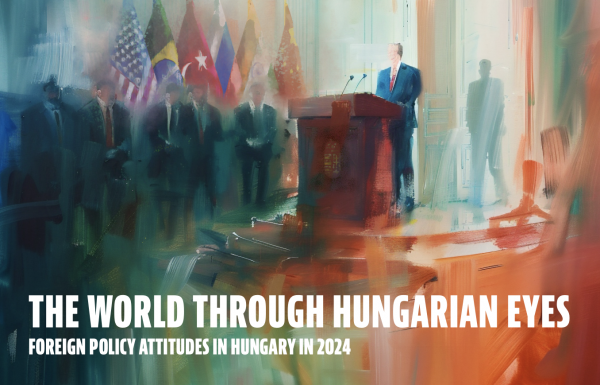
The objective of this study is to show how Hungarian society views our country’s place in the world and what it thinks about international affairs, conflicts, and players. We asked respondents which objectives they believe should define Hungarian foreign policy and which countries we should cooperate with closely.We also surveyed the name recognition and popularity of selected global leaders and public figures, as well as the public’s perception of the United States and China. On the occasion of the 25th anniversary of Hungary’s NATO accession, we pay special attention to the public’s assessment of Hungary’s place in the defence alliance. We also dedicated a separate block of questions to the Hungarian public’s assessment of the Israeli-Palestinian conflict, which flared up massively once again in the autumn of 2023. As part of our foreign policy survey in 2024, we focused especially on mapping the public attitudes towards the Russia-Ukraine war.
Key findings:
- Although a majority of Hungarians believe that the country’s place is in the West, support for Western orientation has declined among the supporters of Fidesz.
- Hungarians view Austria as our country’s most important partner, with Ukraine ranking last on the list in 2024.
- In 2024, Hungarians are more likely to view Ukraine as a threat than Russia.
- 25 years after accession: three-quarters of voters support Hungary’s NATO membership. The vast majority of Hungarians agree with Sweden’s NATO accession and said that Hungary must comply with the NATO security guarantees.
- Support for Ukraine: at this point, only humanitarian assistance enjoys broad public support, a majority of Hungarians oppose both financial and military aid.
- The perceived threat of war has declined in Hungarian society. The share of respondents who believe that the EU sanctions against Russia have backfired is just as high as the share of those who think that the sanctions have hurt both sides equally. Fidesz supporters are more likely to anticipate further Russian military breakthroughs, while opposition voters expect the frontlines to be frozen.
- Although there was a slight deterioration in Hungarians’ perceptions of the US, they still view it as a military and political superpower.
- Hungarians are more likely to perceive China as a great power, but many believe it is aggressive and repressive.
- Israel-Palestine conflict: Hungarians believe the Israeli counterstrikes are justified but disproportionate.
- Vladimir Putin, Pope Francis, and Donald Trump are the most prominent global public figures, but Ursula von der Leyen’s name recognition has increased the most since last year. Pope Francis is the most popular global public figure, while Zelensky has become just as unpopular as Putin.
Authors: András Bíró-Nagy - Kristóf Molnár - Áron Szászi - Attila Varga
Policy Solutions is a progressive political research institute based in Budapest. It was founded in 2008 and it is committed to the values of liberal democracy, solidarity, equal opportunity, sustainability and European integration. The focus of Policy Solutions’ work is on understanding political processes in Hungary and the European Union. Among the pre-eminent areas of our research are the investigation of how the quality of democracy evolves, the analysis of factors driving euroscepticism, populism and the far-right, and election research.
Follow us on Facebook!